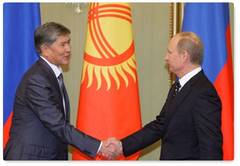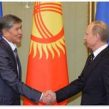
Accession to the Customs Union with Russia, Kazakhstan and Belarus Threatens Kyrgyzstan’s Domestic Stability
Publication: Eurasia Daily Monitor Volume: 10 Issue: 66
By:

On April 3, Kyrgyzstan’s President Almazbek Atambayev made a speech before the students of the Kyrgyz State Technical University in Bishkek. While he addressed a number of issues related to both the domestic and foreign politics of the Central Asian republic, Atambayev particularly stressed the importance of Kyrgyzstan’s expected accession to the Customs Union of Russia, Kazakhstan and Belarus. Should this accession take place within the next several years, Kyrgyzstan could become fully integrated into the framework of the Eurasian Union as it was proposed by Russia’s then-Prime Minister Vladimir Putin on the pages of the daily Izvestia back in September 2011 (Kabar.kg, April 3).
Earlier, on March 29, the country’s Prime Minister Zhantoro Satybaldiyev headed the Kyrgyz Republic’s delegation to an international conference organized with the participation of Russia’s First Deputy Prime Minister Igor Shuvalov, who has been representing Moscow in the Council of the Eurasian Economic Commission since December 2011 and will chair it next year. During his meeting with members of Russia’s official delegation, Satybaldiyev confirmed Bishkek’s political decision to join the Customs Union, which, in his view, would not only permit the growth of external trade but also improve the livelihoods of ordinary citizens. Previously, Kyrgyzstan’s National Council for Sustainable Development, established in late November 2012, had approved the first Sustainable Development Strategy for the period 2013–2017, in which Bishkek’s participation in integration projects with its post-Soviet partners was highlighted as one of the country’s top priorities. Furthermore, as Satybaldiyev said, Kyrgyzstan expects the three members of the Customs Union to assist it in the elaboration of an accession roadmap currently scheduled for June 1, 2013 (Kyrgyzstani Government’s official website, March 29).
Among the positive consequences of Kyrgyzstan’s membership in the Customs Union, Kyrgyzstani authorities cite the lowering of customs duties for both domestic goods going north and those produced in Russia, Kazakhstan and Belarus entering the local market. In 2012, Kyrgyzstan’s trade turnover with the three countries reached $3.1 billion, with imports accounting for almost 80 percent of this figure. At the same time, the Kyrgyz Republic’s bilateral trade with its Chinese neighbor totaled $2.14 billion only in the first half of 2012, whereas Chinese companies exported $2.11 billion worth of goods to Kyrgyzstan, which is four percent higher than in the previous year. Conversely, Kyrgyzstani exports to China amounted to a meager $30 million in January–June 2012, dropping by over 30 percent as compared to the same period in 2011. However, it should be noted that the official statistics do not comprise the illegal bilateral trade practiced by both countries’ nationals, which means that the real value of merchandise crossing the Chinese-Kyrgyzstani border is largely underestimated by customs officials (Kyrtag.kz, March 28; Vecherny Bishkek, December 4, 2012).
According to the chairman of the Kazakhstani Association of Industries, Maral Tompiev, interviewed by Kyrgyzstan’s news agency Vesti.kg in early April, Bishkek’s accession to the Customs Union could only lead to a sharp increase of domestic prices that would naturally tend to emulate the existing price dynamics in Russia and neighboring Kazakhstan. Since Kyrgyzstan is heavily dependent on Chinese imports, notably for its flagship textile industry (Kyrgyzstan is currently the fourth highest exporter of textiles into Russia), the erection of customs barriers between China and Kyrgyzstan would negatively impact the availability of cheap raw materials for the local clothing production. Moreover, such a situation would considerably reduce the revenues of smugglers, bringing thousands of ordinary families to the brink of poverty (Meaninfo.ru, April 3).
Even Kazakhstan did not manage to keep its domestic prices under control following its entry into the Customs Union with Russia and Belarus in 2010. According to the Eurasian Development Bank, the average level of Kazakhstani import duties on goods from third countries grew from 6.2 percent to 10.6 percent in 2010–2011. Besides the progressive growth of prices for foods and other commodities, the situation quickly became particularly difficult for car owners, as the price of the most popular type of gasoline rose by 29.2 percent between January 2010 and August 2011 and that of diesel increased by 34.3 percent during the same timeframe. Although it remains far more stable than its neighbor Kyrgyzstan, Kazakhstan’s participation in the Customs Union has gradually come to provoke allergic reactions even from its former supporters. On March 16, representatives of several opposition parties and movements met in Almaty to demand a national referendum on Kazakhstan’s withdrawal from its current trade partnership with Russia and Belarus. While this move was not endorsed by the required number of delegates, Kazakhstan’s presumed benefits from the Customs Union are increasingly belittled and sometimes even challenged (RIA Novosti, April 3; Eurasian Economic Integration, No. 1(14), February 2012).
At a time when Kyrgyzstan’s authorities are proclaiming their sincere desire to see their country among the Customs Union participants, the domestic political situation is not showing any apparent signs of improvement. On March 6, some 700 supporters of the Ata-Jurt party, whose three MPs had previously tried to illegally enter the parliament building in October 2012, protested in the central square of Jalalabad to demand the dissolution of the legislature and the nationalization of the Kumtor gold mine. Recently, scores of MPs from opposition parties have insisted that the governing coalition dissolve itself in the face of flagrant governmental inefficiency and poor economic performance, despite all the reforms promised by Prime Minister Satybaldiyev. In this context, should Kyrgyzstan’s membership in the Customs Union further undermine its chances of recovery from the economic crisis, it might well experience another bloody revolution (Kabar.kg, April 3; Knews.kg, March 6).




